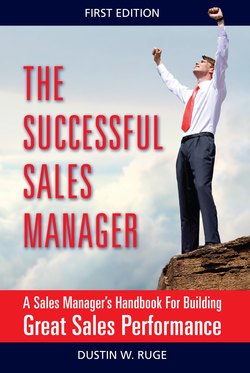Читать книгу The Successful Sales Manager: A Sales Manager's Handbook For Building Great Sales Performance - Dustin Ruge - Страница 3
На сайте Литреса книга снята с продажи.
PREFACE
Оглавление• • •
I will never forget the first time I considered a career in sales. I had studied business and finance in college yet when I considered my first full-time sales position, I felt a need to first confer with a mentor of mine because I was concerned. I wanted to know if selling meant I had to sell my soul first. I had met people who claimed to be able to “sell an ice cube to an Eskimo” and I’d witnessed a constant barrage of TV salespeople who could seemingly sell any piece-of-crap product on TV for the low, low price of $19.95 or $29.95. Or how about those five “easy” payments of $19.95; has anybody figured out what an “easy” payment is yet? I was willing to make compromises to grow in my life journey, but the one thing I was not willing to compromise was my integrity. That was my fear: Would sales make me become something that I was not?
Reflection through maturity and experience has shown me that my initial fear of sales was largely unfounded. The reality is that each and every one of us will deal with buying-and-selling decisions in nearly every aspect of our daily lives—both personally and professionally. We may not consciously know it, but when we go out on dates; dine out; apply for jobs; meet new people; buy clothing, food, and gas, etc., we are all inherently participating in a calculated and methodical buying-and-selling process. That fact that I was once concerned about going into sales as a profession was ignorant of the fact that I was already there in everyday life.
After years of sales and sales management experience, I have come to realize why I am so attracted to and passionate about sales as a profession. I have been deeply competitive and have had an unfettered desire to learn and achieve all my life. Looking back at my childhood, I did not live what many would consider to be a “normal childhood.” I earned the rank of Eagle Scout, competed in archery and roping, played nearly every seasonal sport there was, and could play a full day of Monopoly when necessary if it meant a chance to win. Later I received a NASCAR driver’s license the same year I obtained a regular driver’s license. While my friends were out riding skateboards, I was building racing cars and competing at speeds and within danger levels that many grown men couldn’t handle at any age.
Like most successful salespeople, I am highly competitive by nature. I have a desire to achieve, set goals that are beyond the norm, and will do nearly anything to achieve them. To me, the only thing worse than not winning is not having the ability to learn from my mistakes and try to win again. This is the same psychological state of mind that drives all successful salespeople that I have worked with over the years and what many who have failed in sales lack at the core.
Sales allows me to satisfy my own internal competitive needs while at the same time interacting with people and being able to help them solve their own problems and achieve their goals. In short, a sale allows me to compete and achieve by helping others to do the same. I do not aspire to be able to sell “an ice cube to an Eskimo”—that is for people who sell for other reasons that I cannot relate to. I do not study the buying behaviors of other people so I can simply sell them what I want to sell them to satisfy my own needs alone. I sell so I can more effectively help myself by helping others at the same time. This is what drives me to love sales as a profession and what ultimately led me into sales management.
I wrote this book for one simple reason: to help other sales managers better solve their own problems, grow, compete, and achieve as sales leaders. When better sales leaders are created, better salespeople are hired and developed, better organizational success is achieved, and better results are obtained—from the companies down to the customers. Everybody wins; which is why I got into sales and sales management to begin with.
